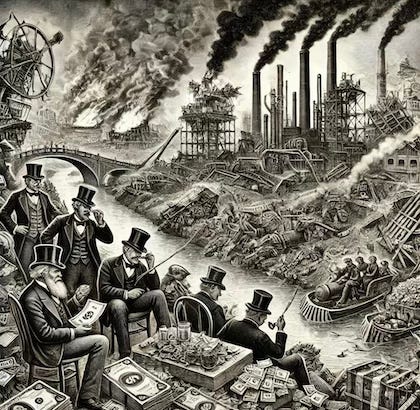The End Game: A World Where Everything is Broken, and Nobody Cares
Welcome to the New Gilded Age—Same Greed, Different Billionaires
If it feels like the world is falling apart lately—not just the looming threat of WWIII, but everything—from crumbling websites and glitchy services to a government being gutted from the inside, from tech failures that range from your microwave to your bank to your favorite social media platform—that’s because it is. And if you think it’s bad now, buckle up. The real collapse isn’t a slow decline; it’s a freefall, and we’re about to hit terminal velocity.
But first, let me remind you that we’ve been through all of this before, and we can survive this collapse too. Probably.
Harken back about 150 years ago, to when a handful of men ran everything. Carnegie, Rockefeller, Morgan—the original billionaire boys’ club. They controlled steel, oil, railroads, and banks, and they didn’t care one bit about the people breaking their backs to keep those industries running. Wages were stagnant, working conditions were deadly, and politicians were so cozy with big business they might as well have been part of the payroll.
If you were a worker? Too bad.
A customer? Pay up and shut up.
A business trying to compete? LOL, good luck.
The whole system was rigged to extract as much wealth as possible from everyone not in the club while the government sat back and let it happen. Sound familiar? It should. Because here we are again.
The new robber barons don’t look like Mr Monopoly or build railroads. They run tech companies, hedge funds, and private equity firms. Instead of steel mill workers and small farmers, they crush small businesses and entire industries. Instead of railroads, they control supply chains, data, and financial systems. Instead of bribing politicians in smoke-filled rooms, they do it out in the open with Super PACs and lobbying groups at extravaganzas where women bring $22.5K purses made of ice.
And just like last time, when too much power is concentrated in a few hands, everything else falls apart.
How a Monopoly-Run Economy Breaks Everything
Everything is falling apart because—Monopolies. When companies don’t have to earn your business anymore, they don’t have to offer good products, treat workers fairly, or even pretend to care about customer service. They just have to make sure you have no way out.
Let’s take a look at where things stand:
Airlines: Want smaller seats, extra fees, and flights that cost more while service gets worse? That’s what happens when only a few giant companies control all the major airlines.
Healthcare: Private insurance companies and hospital conglomerates make billions, while patients fight to afford basic care and deal with automated denial bots rejecting their claims.
Cable & Internet: A few ISPs run the whole market, so you pay top dollar for speeds that lag and service that vanishes when you need it most.
Tech & Software: Google search gets worse. Microsoft products get buggier. Apple locks you into their ecosystem. You can’t leave because they’ve designed it that way.
Power and water: Neglected infrastructure, delayed repairs, and cost-cutting lead to blackouts, toxic water, and wildfires that wipe out entire towns. And when disaster strikes, the only consequence for these companies is a fine—one they simply pass back to you in higher bills.
Quality doesn’t matter. Service doesn’t matter. All that matters is control.
How the Collapse Unfolds, Step by Step
Once corporations stop competing and the government stops regulating, the decline is inevitable. It’s not if things will fall apart—it’s when. And here’s how it plays out:
Step 1: The Death of Talent and Accountability
Companies lay off engineers, designers, and customer support because, hey, why bother making good products or answering the phones? You have to use them anyway.
AI chatbots take over customer service, but they don’t fix anything. They just trap you in a loop of automated hell.
CEOs become obsessed with short-term profits, slashing R&D and innovation until everything feels half-broken all the time.
Step 2: The Breaking of Systems
Websites, apps, and software stop working properly—and nobody fixes them.
Customer service disappears. No more emails, no more phone numbers, just a broken contact form that nobody reads.
Small businesses struggle because they’re forced to rely on giant platforms like Amazon, Google, and Facebook, which constantly change the rules to squeeze them out.
Step 3: No Recourse, No Justice
Consumer protections are gutted. Companies can scam you, overcharge you, and lie to you—with zero consequences.
Lawsuits become impossible because every contract includes forced arbitration.
Price gouging is normalized, and fraud runs wild because regulators have been defunded and dismantled.
Step 4: The Death of Reliability
Public utilities start failing. Water systems, electrical grids, internet services—all break down more often, and nobody is held accountable.
Supply chains collapse. Food shortages, dangerous products, defective goods—it all becomes normal.
Financial institutions take bigger risks because they know the government will bail them out when they crash the system (again).
Step 5: The Great Lock-In
At some point, we reach the final phase—where people realize they can’t escape.
Can’t switch banks.
Can’t change internet providers.
Can’t buy anywhere except Amazon or Walmart.
Can’t find an affordable home because landlords and hedge funds own everything.
Can’t fight back because every regulatory agency has been dismantled.
And once the entire economy becomes a pay-to-exist system, we enter corporate feudalism—where the billionaire class extracts everything from the bottom 90%, and everyone else is stuck in a cycle of endless payments for worse service.
History Tells Us How This Ends
Okay, this is terrifying. But remember: this isn’t the first time America has been swallowed by corporate greed. And every single time, the people have fought back and won.
The Gilded Age led to trust-busting and labor protections.
The Great Depression led to Social Security, financial regulation, and worker rights.
The 2008 financial crash (eventually) led to reforms (weak ones, but still).
The system collapses when people decide they’ve had enough.
So, What Do We Do?
If we don’t want to live in a world where everything is broken and nobody cares, we need to stop this cycle before it fully locks in. That means:
✔️ Breaking up monopolies—No more letting corporations buy up competitors until there’s no choice left.
✔️ Reinforcing consumer protections—Bring back strong regulations that punish fraud, price gouging, and anti-competitive behavior.
✔️ Strengthening worker rights—Because when labor has power, the system works better for everyone.
✔️ Investing in public infrastructure—No more letting private corporations run essential services into the ground.
✔️ Supporting independent businesses and decentralized networks—More local co-ops, open-source software, and alternative platforms that aren’t controlled by megacorporations.
The Bottom Line
This future isn’t inevitable. But it is the logical result of unchecked corporate power.
The good news? Every time in history that monopolies have gotten too big, too greedy, and too destructive, the people have fought back and forced real change.
The only question is: how bad will we let it get before we do something about it?
Stay loud. Stay bold. Stay American!










My entire Political Economics degree is summed up here in this article. Amazing summation and entirely accurate. Just need to get people to understand that “discomfort” is “worth it” and the way this has all gone down is BECAUSE of the reliable indolent response of the people and convenience economy has been an inevitable slippery slope. Minor discomfort in an industrialized country is better than where this is headed here. Thanks for writing, I enjoy your stuff.
This is an amazingly brilliant article. It’s obvious that our economic and political system is breaking down fast as the Republican Administration tries to wreck the world economy so the oligarchs can buy up (or seize) assets at bargain basement prices (The Panama Canal, Greenland, and Canada for starters). But as I look around most people don’t realize it yet, except the poor beggars laid off by the Department of Greed Extraction (DOGE). My own experience with AI chatbots has been infuriating: an airline bot that kept directing me to my email for a non-existent e-ticket, with no customer service number to call; a Department of Motor Vehicles (DMV) bot, “Myles,” that told me there was no one available to take my call after endlessly sending me through a phone tree and ignoring my request for a “customer service representative”; and a health insurance bot that told me that “due to high call volume” there was no one available to take my call and to call back later. As discussed in the article, I had nowhere to go because I was locked into these services. Complaining, if even possible, would be a further waste of my time and energy. I have had to find alternative ways to find the answers to my questions. Furthermore, just today, I was informed that due to a “service interruption detected in my area,” I had no access to the internet, despite subscribing to an expensive internet service.
Elon wants to replace air traffic controllers, and just about every other government service, with AI. This can’t end well. I agree with Lady Libertie that right now is the time to stop this destruction of our systems that is intended to make us subservient to a few corporate monopolies offering maddeningly inefficient and inferior services.